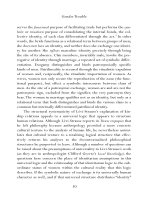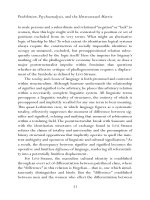GENDER TROUBLE 131
Bạn đang xem bản rút gọn của tài liệu. Xem và tải ngay bản đầy đủ của tài liệu tại đây (20.58 KB, 1 trang )
Gender Trouble
Strauss’s notoriously nondiachronic structuralism. But what leads
her to the conclusion that gender is merely a function of compulsory
heterosexuality and that without that compulsory status, the field of
bodies would no longer be marked in gendered terms? Clearly, Rubin
has already envisioned an alternative sexual world, one which is attributed to a utopian stage in infantile development, a “before” the law
which promises to reemerge “after” the demise or dispersal of that law.
If we accept the Foucaultian and Derridean criticisms of the viability of
knowing or referring to such a “before,” how would we revise this narrative of gender acquisition? If we reject the postulation of an ideal
sexuality prior to the incest taboo, and if we also refuse to accept the
structuralist premise of the cultural permanence of that taboo, what
relation between sexuality and the law remains for the description of
gender? Do we need recourse to a happier state before the law in order
to maintain that contemporary gender relations and the punitive production of gender identities are oppressive?
Foucault’s critique of the repressive-hypothesis in The History of
Sexuality,Volume I argues that (a) the structuralist “law” might be understood as one formation of power, a specific historical configuration and
that (b) the law might be understood to produce or generate the desire
it is said to repress.The object of repression is not the desire it takes to be
its ostensible object, but the multiple configurations of power itself, the
very plurality of which would displace the seeming universality and
necessity of the juridical or repressive law. In other words, desire and its
repression are an occasion for the consolidation of juridical structures;
desire is manufactured and forbidden as a ritual symbolic gesture
whereby the juridical model exercises and consolidates its own power.
The incest taboo is the juridical law that is said both to prohibit
incestuous desires and to construct certain gendered subjectivities
through the mechanism of compulsory identification. But what is to
guarantee the universality or necessity of this law? Clearly, there are
anthropological debates that seek to affirm and to dispute the universality of the incest taboo,46 and there is a second-order dispute over
96









